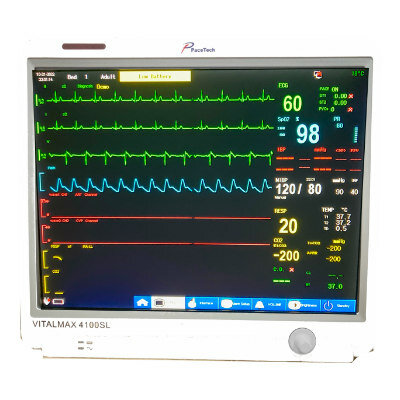AI Predicts Pancreatic Cancer Three Years before Diagnosis from Patients’ Medical Records
|
By HospiMedica International staff writers Posted on 10 May 2023 |

Screening for common cancers like breast, cervix, and prostate cancer relies on relatively simple and highly effective techniques, such as mammograms, Pap smears, and blood tests. These methods have revolutionized outcomes for these diseases by enabling early detection and intervention during the most treatable stages. However, pancreatic cancer screening is more challenging and costly. Physicians primarily consider family history and genetic mutations, which are important risk indicators but often overlook many patients. There is a need for a method that can expedite the diagnosis of pancreatic cancer, which is frequently found in advanced stages when treatment is less effective and outcomes are poor. Now, an artificial intelligence (AI) tool can successfully identify individuals at the highest risk for pancreatic cancer up to three years before diagnosis using only patients' medical records.
The findings of the new research led by investigators at Harvard Medical School (Boston, MA, USA; www.hms.harvard.edu) and the University of Copenhagen (Copenhagen, Denmark; www.ku.dk) suggest that AI-based population screening could be valuable for detecting those at increased risk for pancreatic cancer. Applied at scale, the AI tool could accelerate detection, lead to earlier treatment, and improve outcomes and extend patients' life spans. In the study, the AI algorithm was trained on two separate datasets totaling nine million patient records from Denmark and the U.S. The researchers "asked" the AI model to look for telltale signs based on the data contained in the records. Based on combinations of disease codes and their timing, the model was able to predict which patients are likely to develop pancreatic cancer in the future. Interestingly, many of the symptoms and disease codes were not directly related to or originating from the pancreas.
The researchers tested different versions of the AI models for their ability to detect people at elevated risk for disease development within different time scales — 6 months, one year, two years, and three years. Overall, each version of the AI algorithm was substantially more accurate at predicting who would develop pancreatic cancer than current population-wide estimates of disease incidence. The researchers believe the model is at least as accurate in predicting disease occurrence as current genetic sequencing tests, which are usually only available for a small subset of patients in datasets.
A significant advantage of the AI tool is that it can be used on any patient with available health records and medical history, not just those with known family history or genetic predisposition for the disease. This is particularly important because many high-risk patients may not be aware of their genetic predisposition or family history. Without symptoms and a clear indication of high risk for pancreatic cancer, clinicians may be hesitant to recommend more sophisticated and expensive testing, such as CT scans, MRI, or endoscopic ultrasound. When these tests are used and suspicious lesions discovered, the patient must undergo a procedure to obtain a biopsy. An AI tool that identifies those at the highest risk for pancreatic cancer would ensure that clinicians test the right population while sparing others unnecessary testing and additional procedures, according to the researchers.
“One of the most important decisions clinicians face day to day is who is at high risk for a disease, and who would benefit from further testing, which can also mean more invasive and more expensive procedures that carry their own risks,” said study co-senior investigator Chris Sander, faculty member in the Department of Systems Biology in the Blavatnik Institute at HMS. “An AI tool that can zero in on those at highest risk for pancreatic cancer who stand to benefit most from further tests could go a long way toward improving clinical decision-making.”
“Many types of cancer, especially those hard to identify and treat early, exert a disproportionate toll on patients, families and the healthcare system as a whole,” said study co-senior investigator Søren Brunak, professor of disease systems biology and director of research at the Novo Nordisk Foundation Center for Protein Research at the University of Copenhagen. “AI-based screening is an opportunity to alter the trajectory of pancreatic cancer, an aggressive disease that is notoriously hard to diagnose early and treat promptly when the chances for success are highest.”
Related Links:
Harvard Medical School
University of Copenhagen
Latest Health IT News
- Machine Learning Model Improves Mortality Risk Prediction for Cardiac Surgery Patients
- Strategic Collaboration to Develop and Integrate Generative AI into Healthcare
- AI-Enabled Operating Rooms Solution Helps Hospitals Maximize Utilization and Unlock Capacity
- First Fully Autonomous Generative AI Personalized Medical Authorizations System Reduces Care Delay
- Electronic Health Records May Be Key to Improving Patient Care, Study Finds
- AI Trained for Specific Vocal Biomarkers Could Accurately Predict Coronary Artery Disease
- First-Ever AI Test for Early Diagnosis of Alzheimer’s to Be Expanded to Diagnosis of Parkinson’s Disease
- New Self-Learning AI-Based Algorithm Reads Electrocardiograms to Spot Unseen Signs of Heart Failure
- Autonomous Robot Performs COVID-19 Nasal Swab Tests

- Statistical Tool Predicts COVID-19 Peaks Worldwide
- Wireless-Controlled Soft Neural Implant Stimulates Brain Cells
- Tiny Polymer Stent Could Treat Pediatric Urethral Strictures
- Human Torso Simulator Helps Design Brace Innovations
- 3D Bioprinting Rebuilds the Human Heart
- Nanodrone Detects Toxic Gases in Hazardous Environments
Channels
Artificial Intelligence
view channel
AI-Powered Algorithm to Revolutionize Detection of Atrial Fibrillation
Atrial fibrillation (AFib), a condition characterized by an irregular and often rapid heart rate, is linked to increased risks of stroke and heart failure. This is because the irregular heartbeat in AFib... Read more
AI Diagnostic Tool Accurately Detects Valvular Disorders Often Missed by Doctors
Doctors generally use stethoscopes to listen for the characteristic lub-dub sounds made by heart valves opening and closing. They also listen for less prominent sounds that indicate problems with these valves.... Read moreCritical Care
view channel
Deep-Learning Model Predicts Arrhythmia 30 Minutes before Onset
Atrial fibrillation, the most common type of cardiac arrhythmia worldwide, affected approximately 59 million people in 2019. Characterized by an irregular and often rapid heart rate, atrial fibrillation... Read more
Breakthrough Technology Combines Detection and Treatment of Nerve-Related Disorders in Single Procedure
The peripheral nervous system (PNS) serves as the communication network that links the brain and spinal cord to every other part of the body. It consists of two parts: the somatic nervous system, which... Read moreSurgical Techniques
view channel
Hydrogel-Based Miniaturized Electric Generators to Power Biomedical Devices
The development of engineered devices that can harvest and convert the mechanical motion of the human body into electricity is essential for powering bioelectronic devices. This mechanoelectrical energy... Read moreWearable Technology Monitors and Analyzes Surgeons' Posture during Long Surgical Procedures
The physical strain associated with the static postures maintained by neurosurgeons during long operations can lead to fatigue and musculoskeletal problems. An objective assessment of surgical ergonomics... Read more.jpg)
Custom 3D-Printed Orthopedic Implants Transform Joint Replacement Surgery
The evolving field of 3D printing is revolutionizing orthopedics, especially for individuals requiring joint replacement surgeries where traditional implants fail to provide a solution. Although most people... Read more
Cutting-Edge Imaging Platform Detects Residual Breast Cancer Missed During Lumpectomy Surgery
Breast cancer is becoming increasingly common, with statistics indicating that 1 in 8 women will develop the disease in their lifetime. Lumpectomy remains the predominant surgical intervention for treating... Read morePatient Care
view channel
Surgical Capacity Optimization Solution Helps Hospitals Boost OR Utilization
An innovative solution has the capability to transform surgical capacity utilization by targeting the root cause of surgical block time inefficiencies. Fujitsu Limited’s (Tokyo, Japan) Surgical Capacity... Read more
Game-Changing Innovation in Surgical Instrument Sterilization Significantly Improves OR Throughput
A groundbreaking innovation enables hospitals to significantly improve instrument processing time and throughput in operating rooms (ORs) and sterile processing departments. Turbett Surgical, Inc.... Read more
Next Gen ICU Bed to Help Address Complex Critical Care Needs
As the critical care environment becomes increasingly demanding and complex due to evolving hospital needs, there is a pressing requirement for innovations that can facilitate patient recovery.... Read moreGroundbreaking AI-Powered UV-C Disinfection Technology Redefines Infection Control Landscape
Healthcare-associated infection (HCAI) is a widespread complication in healthcare management, posing a significant health risk due to its potential to increase patient morbidity and mortality, prolong... Read morePoint of Care
view channel
Critical Bleeding Management System to Help Hospitals Further Standardize Viscoelastic Testing
Surgical procedures are often accompanied by significant blood loss and the subsequent high likelihood of the need for allogeneic blood transfusions. These transfusions, while critical, are linked to various... Read more
Point of Care HIV Test Enables Early Infection Diagnosis for Infants
Early diagnosis and initiation of treatment are crucial for the survival of infants infected with HIV (human immunodeficiency virus). Without treatment, approximately 50% of infants who acquire HIV during... Read more
Whole Blood Rapid Test Aids Assessment of Concussion at Patient's Bedside
In the United States annually, approximately five million individuals seek emergency department care for traumatic brain injuries (TBIs), yet over half of those suspecting a concussion may never get it checked.... Read more
New Generation Glucose Hospital Meter System Ensures Accurate, Interference-Free and Safe Use
A new generation glucose hospital meter system now comes with several features that make hospital glucose testing easier and more secure while continuing to offer accuracy, freedom from interference, and... Read moreBusiness
view channel
Johnson & Johnson Acquires Cardiovascular Medical Device Company Shockwave Medical
Johnson & Johnson (New Brunswick, N.J., USA) and Shockwave Medical (Santa Clara, CA, USA) have entered into a definitive agreement under which Johnson & Johnson will acquire all of Shockwave’s... Read more
















